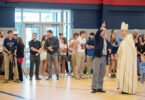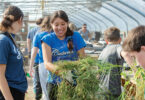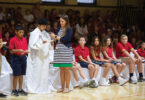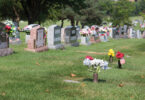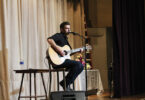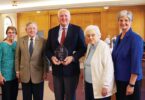Bishop Ward High School gives students hands-on experience today to prepare them for future
by Jessica Langdon
jessica.langdon@theleaven.org
KANSAS CITY, Kan. — Truman Snow is a big believer in turning students into scientists — sometimes even to their own amazement.
Take the case of the high school freshman who hated biology a few years ago.
She’s now a neonatal nurse at Children’s Mercy Hospital.
“And she loves it!” said Snow, head of the three-person science department at Bishop Ward High School in Kansas City, Kan.
This team is honoring a long tradition at the high school — producing scientists — and they are doing it in a way that looks to the future.
“I answer a question with a question,” explained Snow.
As students work to answer the questions, they talk themselves toward conclusions — just as scientists would in the professional world.
Ward hopes to equip today’s students for scientific success tomorrow through a variety of programs, classes and an introduction to a network of professional scientists.
“I believe that they’re unique — not just by themselves, but when you put them together as a package, it’s a very impressive package,” said Father Michael Hermes, Bishop Ward High School president.
“I think my job here is to just expose our students to as much as I can,” said Snow.
That includes what, for now, lies beyond the parameters of science as well.
“We’re trying our best to make students aware that science and religion are both the same thing — that one’s trying to prove the other,” said Snow. “As the students study science, they realize that there is more to life. There is a higher being. We three in this department really try our best to point that out in every lesson we teach.”
It’s a jungle in there:
Animals provide hands-on learning
Ignacio Martinez-Alonso has a little help in making science come alive for his biology and zoology students.
The subjects his students are studying actually make their home inside the high school.
Bishop Ward High School’s St. Francis of Assisi Animal Room houses 68 species.
“You never know what’s going to walk through the door,” said Alonso.
The room is not only home to the animals; it provides a hands-on education for the students.
“These animals, to me, are like living books that we are using for education,” said Alonso, who teaches biology, earth and space, chemistry and zoology.
“It is very different from seeing animals in books to actually see the animals in person and work with them,” he said.
Beyond studying the exotic animals’ anatomy and physiology, students take responsibility for their care, even during the summer and holidays.
“What other school can you go to that has an owl flying around?” said Gabe Wilson, a senior at Ward — and a big fan of the animal room.
Or an albino Burmese python?
An alligator snapping turtle that first arrived about the size of a quarter now tips the scales at 35 pounds.
Another star is Cloud, a 39-year-old umbrella cockatoo from Australia who greets every visitor by saying, “Hi, Cloud.”
He yells for attention when people walk out of his sight. That part is loud — but entertaining to senior Cydney Bushue, who otherwise finds the animal room a peaceful, quiet place.
She loves all the animals.
Bushue was hooked even before high school when Alonso introduced a few at her middle school.
Now, as a Ward student, she has shared animals with other schools.
“When I got here and started working here, I wasn’t afraid to hold the snakes or to clean the cages or anything,” said Bushue.
That’s not always the case.
“A lot of students come in with ingrained phobias and fears,” said Alonso. “The more the students get to know the animals, the more they get to work with them, their whole attitude toward animals like snakes and scorpions and tarantulas changes.”
They develop a new respect for God’s creatures.
“That is something you cannot do with books,” said Alonso.
Students build a connection and sense of pride in seeing that the animals stay healthy (and they do lots of looking through the microscope to make sure they are) and well cared for.
“Working in here has taught me how to deal with things that suddenly pop up,” said Bushue, who has learned patience, especially in keeping the room clean.
“They teach you to be prepared for whatever comes next, how to take something suddenly,” she said.
This room provides a hands-on look at what it might be like to work as a wildlife biologist or veterinarian.
“I think it’s easier for me to teach them things like anatomy and physiology and biology when they can actually see it,” said Alonso. “They can see the snake laying eggs. They can actually feel the muscles. And we do a lot of dissections.”
Graduates often check in on their favorite animals.
“They still feel like this is part of their lives, so I think that’s really awesome,” said Alonso.
Area schools embark on science path together
Fusion is more than a topic students study in science classes.
It’s a way of life among the Catholic schools of Wyandotte County, thanks to Bishop Ward’s participation in the Kansas City STEM Alliance. (STEM stands for Science, Technology, Engineering and Math, and the alliance aims to prepare students now for the workforce in the future.)
Rachel Smith, Ward physics and chemistry teacher, constantly encourages her students to consider those in-demand fields.
“That’s the best way to guarantee that you’ll have a job,” she tells them.
The idea is to create a continuum of science education — right down to the specific curriculum and textbooks — for students from kindergarten through 12th grade.
One goal is to prepare younger students for the day they walk into Ward so they can hit the ground running.
Most of Bishop Ward’s students come through the five Catholic grade schools in Wyandotte County. So part of the plan puts Legos into the hands of the youngest students so they can start building a solid foundation about how things work. Later, they’ll study things like electricity.
“They do a small robot in middle school, and then they do the big stuff here,” said Truman Snow, chairman of the science department at Bishop Ward.
For instance, Ward has a robotics team that competes in the FIRST Robotics competition.
The grade school principals are enthusiastic about the sharing of ideas, especially when many schools have only one or two science teachers. This gives them an opportunity to collaborate.
“We’re starting with sixth-, seventh- and eighth-graders,” said Kathy Rhodes, principal of St. Patrick School in Kansas City, Kan. “But [for the younger grades]we got our Lego League starter kit, and several parents and kids are excited about getting that going.”
“I think it’s providing a team atmosphere,” said Karen Davis, principal of Bishop Ward High School.
She’s excited to see Snow’s ideas for the future of science coming to life.
“His expertise of where we want our students to be with each of these areas of science when they walk into our building, I think, has been a huge support for the middle school teachers as they’ve started planning and looking at their curriculum,” she said.
And Snow has even more plans.
“I hope that before I retire we have what I call ‘pathways’ that work with the middle school. So, for the kids who think they may want to do engineering, we’ve got steps for them to do that in high school — so when they leave here and get to college, they know pretty much what they [need to] do and how it works,” said Snow.
Same thing with the biomedical field.
Rhodes hopes the strengthened collaboration among schools in the community will keep people excited about science topics.
“I think that it helps develop their true interest,” she said.
In this way, students are studying different branches of a vast field as opposed to viewing science as one generic topic.
And instead of simply saying they like science or they don’t, they can identify favorite areas, said Rhodes.
“As a parent, it’s encouraging to me that we’re not just looking for one year,” she said. “We’re looking at the total person as they finish high school and go to college and become productive Catholic members of society.”
Lecture series exposes students to accomplished scientists
The school’s faculty and administration make sure the 360 students at Ward have a chance to learn a little about everything — and to see how science fits in, said Truman Snow, science department chair.
What better way to accomplish that than to bring in scientists — including many Ward alumni — to share their stories through the Science Lecture Series?
“With the lecture series, we are trying our best to show the kids that beyond high school there are so many levels of things they can do in science,” said Snow.
The guest lecturers cherish the spiritual opportunity to reflect on their own paths and honor the people who helped them achieve their dreams.
There are doctors and nurses, naturally, but the series stretches far beyond that.
“We try to do engineering and every aspect of science we can get,” said Snow.
Tim Menard, a wildlife biologist with the U.S. Fish and Wildlife Service, talked to the students in October about his work at the Flint Hills and Marais des Cygnes National Wildlife Refuges.
“It’s a privilege to have the opportunity to come and discuss wildlife conservation and careers in science, and to foster the relationship that we’ve already established with the high school,” said Menard.
Menard, a parishioner of St. Mary Church in Hartford, even invited Bishop Ward students this fall to join him out in the field to observe firsthand aspects of the duck migration season.
To him, being Catholic and working in science dovetail perfectly.
“My personal thoughts are that my faith encourages me to protect and restore God’s creation,” he said.
He believes this lecture series accomplishes an important mission — encouraging students to consider careers in science fields.
In his DNA
Gabe Wilson was a freshman at Bishop Ward High School when visiting lecturer Dr. Barry Kaplan piqued his interest with a mention of internships at the National Institute of Mental Health.
After the lecture, Wilson introduced himself to the senior investigator in neuroscience with the NIMH, making an early connection.
Last year, as a junior, Wilson decided to apply — and won an eight-week paid summer internship with the NIMH, part of the National Institutes of Health, in Bethesda, Md.
The prestigious internship was one of only a few awarded to high school students; most were in college.
“It was an amazing honor,” said Wilson, now a senior. “I wouldn’t have had this if it wasn’t for Ward.”
Wilson’s passion for science started early.
He was always asking questions, wanting to know why the sky was blue and how everything worked.
“You can ask any of my friends, and they’ll say I know a lot of random information,” he said.
His interest soared in seventh grade at St. Patrick School in Kansas City, Kan., where he studied science with teacher Joy Treacy.
He got to know the Ward family, including science chair Truman Snow, through middle school science fairs, and ultimately decided to attend Ward, where he’s tackled everything from robotics to football.
Once he learned he’d won the NIMH internship — and had completed the mountain of attendant paperwork — he was ready to head east for the summer.
Through Bishop Ward’s alumni association, he landed a place to stay.
“You have to be prepared,” he said. As a 17-year-old student largely on his own for the first time in a new city, he had a lot to figure out — including the public transportation system.
“You don’t have anyone looking over your shoulder to help you, and you have to make smart decisions,” he said.
In the lab, Kaplan invited Wilson to look at a project he’s been working on to see what the Ward student observed.
Well-versed in many areas of science, Wilson now doesn’t skip a beat when he says he spent much of his summer working on quantitative polymerase chain reaction of mRNA.
Ward loves to see students take on internships, such as this one, sparked during the lecture series or those achieved through connections with alumni working in science careers.
Wilson hopes to become a neonatal doctor, helping babies thrive and lead full lives, and believes his internship will help with college admission.
“He’s a great example of what a Bishop Ward student should be,” said Snow, adding that even beyond Wilson’s intellect, he is well-rounded and from a great family — and he cares about people.
Wilson believes he has learned to ask tough questions, and to be a person of integrity at Ward.
“It’s made me into a very good Catholic who understands our faith,” he added.

